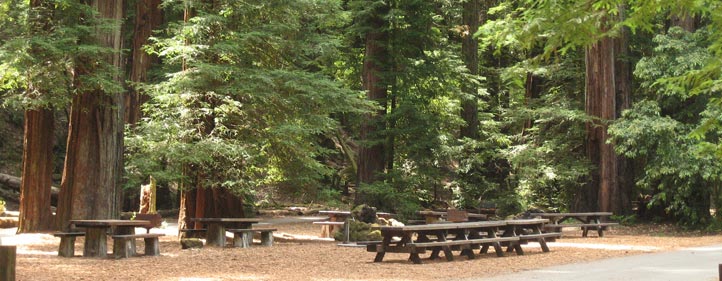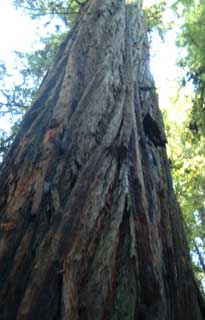Additional
History
In 1860 R.B. Lundsford established a lumber camp on the north bank of the Russian
River which grew with success and was later know as “Stumptown”. In
1867 a 25 year old Swiss immigrant, George E. Guerne, arrived in Stumptown. Guerne
purchased land in the area and laid out a subdivision which became know as “Guernewood
Park”. Guerne also built and operated a sawmill in Stumptown. Before long,
Stumptown was renamed for its most important resident and has been known ever
since as Guerneville.
In 1867 Thomas H. Stone and A. E. Laude established claims on 240 acres of
valley property 3 miles north of Guerneville. These 240 acres are the heart of
what is now Armstrong Redwoods State Reserve. This property and 200 adjoining
acres were eventually consolidated under the ownership of Colonel James Boydston
Armstrong in 1875.
Armstrong was born on August 29, 1824, in Waynesburg, Ohio. His career had
included journalism and surveying in his native state and elsewhere. During the
civil War, Armstrong had been commissioned a Colonel in the Union Army –
a title he would be known by ever after. In 1874 Armstrong relocated permanently
to Sonoma County from Ohio. Armstrong’s business ventures were many, and
one of them involved him in the Guerneville lumber boom of the 1870’s. Armstrong
logged and also owned and operated a sawmill site north of Guerneville. This mill
produced approximately 5 million board feet of lumber per year. His other business
interests included subdivisions in Santa Rosa. He sold lots to homebuilders at
bargain prices and encouraged the new owners to plant French prune and Gravenstein
apple trees. Armstrong was keenly interested in crop plants and experimented on
different species in nurseries he established in the Santa Rosa area. His interest
in this field led to his friendship with another Santa Rosa resident, Luther Burbank.
In 1878, Armstrong made a gift deed of the 440 acres mentioned previously
to his daughter, Kate Armstrong. The price recorded for this transaction was “in
consideration of one dollar, love and affection”. It had been Armstrong’s
intention for this property (an old growth, redwood grove) to be preserved and
eventually be operated as an arboretum. The Colonel worked long and hard at assuring
the preservation of the grove. In 1891, he attempted to establish an administration
for the grove patterned after Stanford University’s, with Luther Burbank
as the chairman of its first committee. Unfortunately, Armstrong was unable to
realize his plan as it required a special act of the State legislature and such
support did not exist at the time. Despite this defeat, Armstrong continued to
work and plan toward the realization of his dream, the preservation of his beloved
grove of redwoods.
Armstrong suffered serious financial distress due to the failure of a Santa
Rosa bank. His daughter Kate was a life long invalid and her health went into
a further decline as did his own. As a consequence of family pressure, 190 of
Kate’s 440 acres were deeded to her brother, Walter. This parcel was later
purchased by Armstrong family friend, Harrison M. LeBaron. Kate Armstrong died
in 1898 and the Colonel passed on in 1900 after a series of incapacitating strokes.
The struggle to preserve the grove was left in the capable hands of Lizzie Armstrong
Jones – Armstrong’s surviving daughter – and the LeBaron family.
They mounted an energetic campaign which used public meetings, rallies, and car-caravans
to direct public attention to the need to preserve this last remnant of the once
mighty redwood forest.
Their efforts were finally rewarded and in 1917 the County of Sonoma passed
an initiative to purchase the property for $80,000.00. This purchase was contingent
on a agreement that Lizzie and the LeBaron family each put up $5,000.00 of the
purchase price as a donation – not an empty gesture when you consider what
value a 1917 dollar had against today’s.
The grove was operated by Sonoma County until 1934 when the State took ownership
of it as part of the financial arrangement whereby Sonoma Coast State Park was
purchased. The grove was opened to the public as Armstrong Redwoods State Park
in 1936. In 1964 the grove’s status was changed when a greater understanding
of its ecological significance prompted a more protective management of the resource.
Since 1964 Armstrong Redwoods has enjoyed the status of State Reserve.
The story of Armstrong’s grove continues – it’s as dynamic
as all living entities. But most of all it is the people who use it, enjoy it,
manage and protect it who affect it the most. Recent changes and resulting conflict
centered on different perceptions may be felt by the persons involved as either
minor asides or major issues in the scope of their lifetimes. In the much grander
panorama of the grove’s lifetime, human actions may have long range consequences
unknowable to short-lived individual human beings. It is therefore only right
that people of integrity and good will speak for the grove, for she can only talk
to our hearts.
(Information provided by the Armstrong Redwoods State Reserve unit historian
and by other works, materials and records, including information by Historian
John McKenzie)
Content created by the California Department of Parks and Recreation |


